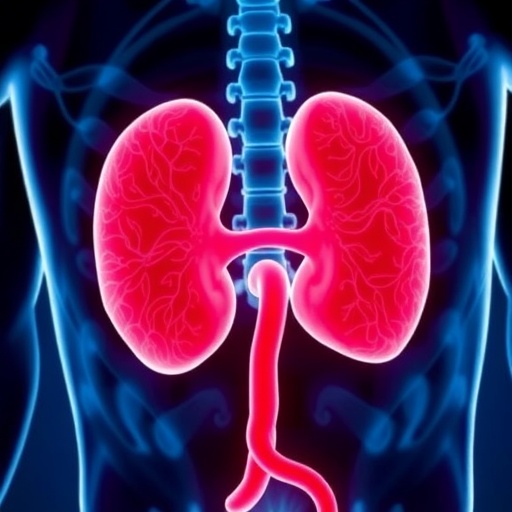In a groundbreaking development poised to transform the landscape of prostate cancer diagnostics, researchers from Karolinska Institutet, Imperial College London, and the China Academy of Chinese Medical Sciences have unveiled a novel approach that harnesses artificial intelligence and advanced molecular profiling to detect prostate cancer at its earliest stages. By analyzing gene expression at an unprecedented single-cell resolution within tumor tissues and integrating these insights through machine learning algorithms, the team has identified a suite of highly precise urinary biomarkers that may outperform the current standard blood test, PSA (Prostate-Specific Antigen), in accuracy and reliability.
Prostate cancer remains one of the leading causes of cancer-related death among men worldwide, with early detection critically influencing prognosis and treatment outcomes. Conventional diagnostic methods, including PSA screening and biopsies, are often marred by limitations such as false positives, invasiveness, and patient discomfort. The urgent need for non-invasive, reliable biomarkers has driven this international collaboration to explore innovative solutions that could redefine clinical practice.
Central to their methodology was the application of spatial transcriptomics, a cutting-edge technique that maps the activity of all messenger RNA molecules across thousands of individual cells within prostate tumor samples. This provided a detailed landscape of gene expression, relating directly to tumor localization and severity. By capturing the spatial and temporal dynamics of gene activity, the researchers constructed comprehensive digital models of prostate cancer, essentially creating a molecular atlas of the disease at a cellular level.
These digital constructs were then subjected to sophisticated AI-driven analyses, employing pseudotime algorithms that order cells along a trajectory of disease progression. This allowed the identification of dynamic biomarkers reflecting not just the presence but also the aggressiveness of the tumor. The biomarkers discovered through this integrated approach represent specific proteins whose expression patterns correlate strongly with malignant transformation and tumor burden.
Following computational discovery, the robustness of these biomarkers was rigorously evaluated across biological samples derived from nearly 2,000 patients, encompassing blood, prostate tissue biopsies, and, critically, urine. Remarkably, the urinary biomarkers demonstrated exceptional diagnostic precision, surpassing that of PSA, and were capable of distinguishing not only cancerous from non-cancerous states but also indicating disease severity. This represents a paradigm shift, suggesting that simple, non-invasive urine tests could soon be a frontline tool in prostate cancer screening.
Dr. Mikael Benson, lead investigator and senior researcher at Karolinska Institutet, emphasized the practical implications: “Utilizing urine as a medium for biomarker detection offers unparalleled convenience and patient compliance. It eliminates the need for invasive procedures, reduces discomfort, and opens the potential for at-home sampling. This innovation aligns perfectly with the future vision of personalized and accessible healthcare.”
The study’s integration of spatial transcriptomics with machine learning marks one of the most advanced uses of computational biology in oncology to date. By decoding the heterogeneity of prostate tumors at the microscale, the approach addresses a major barrier in cancer diagnostics—the intrinsic variability and complexity within tumor cells that often confound traditional biomarker discovery.
Experts anticipate that this research will catalyze subsequent large-scale clinical trials to validate the efficacy and reliability of the urinary biomarkers in diverse populations. Discussions are already underway with Professor Rakesh Heer of Imperial College London, who leads the TRANSFORM study, the UK’s national prostate cancer research initiative. This platform could serve to expedite the translation of these findings into clinical applications, accelerating the availability of superior diagnostic tools.
Beyond early diagnosis, the refined biomarkers hold promise for significantly reducing unnecessary prostate biopsies—procedures often associated with risks such as infection and bleeding—and mitigating overdiagnosis and overtreatment. Enhanced biomarker precision will enable clinicians to better stratify patients based on tumor aggressiveness, tailoring intervention strategies more effectively.
The financial backing of this ambitious project came primarily from the Swedish Cancer Society, Radiumhemmet, and the Swedish Research Council, reflecting a strong institutional commitment to advancing cancer diagnostics through innovative science. Importantly, the research team declared no conflicts of interest aside from Dr. Benson’s scientific involvement with Mavatar, Inc., an enterprise focusing on AI-driven biological data analysis.
Published online on April 28, 2025, in the high-impact journal Cancer Research, the study titled “Combining Spatial Transcriptomics, Pseudotime, and Machine Learning Enables Discovery of Biomarkers for Prostate Cancer” represents a landmark contribution. It exemplifies how interdisciplinary approaches—melding computational modeling, molecular biology, and clinical oncology—can unravel complex disease mechanisms and translate them into tangible clinical benefits.
As prostate cancer continues to challenge medical systems worldwide, this innovative research lays a vital foundation for developing next-generation diagnostic assays. Its approach could not only lead to earlier, more accurate detection but also herald a new era of precision oncology, where biomarker-informed decisions improve outcomes and reduce healthcare burdens.
Experts urge the scientific and medical communities to closely follow these developments. The ultimate goal remains clear: transform prostate cancer diagnosis from an often uncertain and invasive process to a streamlined, accessible, and highly reliable test that empowers clinicians and patients alike.
Subject of Research: Human tissue samples
Article Title: Combining Spatial Transcriptomics, Pseudotime, and Machine Learning Enables Discovery of Biomarkers for Prostate Cancer
News Publication Date: 28-Apr-2025
Web References: https://doi.org/10.1158/0008-5472.CAN-25-0269
References: Smelik M, Diaz-Roncero Gonzalez D, An X, Heer R, Henningsohn L, Li X, Wang H, Zhao Y, Benson M. Combining spatial transcriptomics, pseudotime and machine learning to find biomarkers for prostate cancer. Cancer Research. 2025 Apr 28. doi: 10.1158/0008-5472.CAN-25-0269.
Keywords: Prostate cancer, Biomarkers, Cancer research, Urine, Prostate tumors, Messenger RNA, Medical diagnosis, Oncology
Tags: accuracy of PSA test alternativesadvanced molecular profiling techniquesartificial intelligence in cancer diagnosticsearly detection of prostate cancermachine learning in medical diagnosticsnon-invasive cancer detection methodsprostate cancer biomarkersprostate cancer prognosis and treatment outcomesprostate cancer research collaborationssingle-cell gene expression analysisspatial transcriptomics in oncologyurine test for prostate cancer





